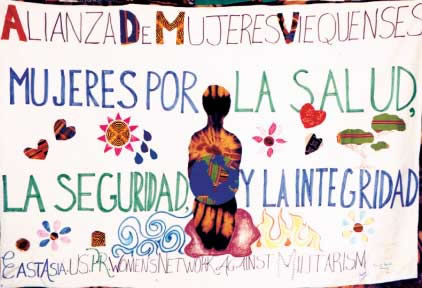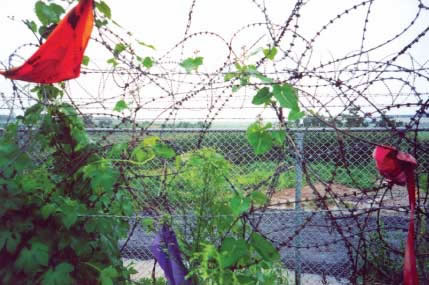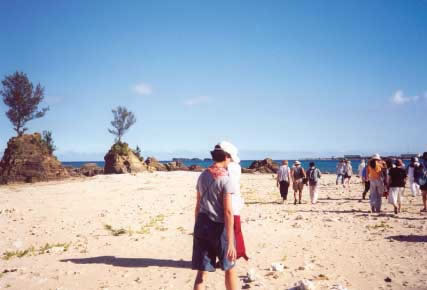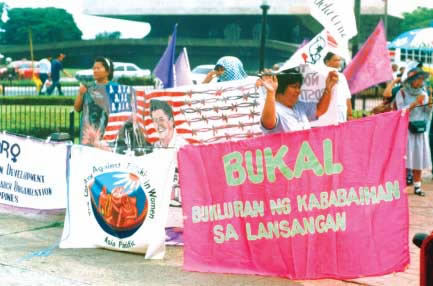Women’s Activism for Genuine Security
Postcard Set
![]()
 |
Alianza Banner, Puerto RicoThis banner was made by Network participants from Puerto Rico and the USA for Alianza de Mujeres Viequenses (Vieques Women's Alliance), Puerto Rico- an affiliated organization. Alianza women opposed the U.S. Navy's bombing training on the island of Vieques. They work to promote women's health and economic opportunities, and to demilitarize their island. October 1999. Photo Gwyn Kirk |
 |
Kuni Bombing RangeThe Kuni bombing range is 50 miles south of Seoul, and 1 mile away from Maehyangri, a small farming and fishing village. The bombing range has been used by the U.S. military since 1951, during the height of the Korean War. Bombing takes place 250 days a year, Mon-Fri, from 9 1m until as late as 11 pm. Due to the immense noise and vibration from the jets and explosions, villagers suffer from high rates of depression, suicide, and post-traumatic stress disorder. They are also exposed to military toxins from the bombs. Some residents of Maehyangri, including children, have been killed by stray bullets and bombs. July 2001. Photo: Don Mee Choi |
 |
Henoko, OkinawaNetwork participants visit Okinawan women activists campaigning against a proposed state-of -the art base for U.S. Marines to be constructed in the ocean near this beach at Henoko (Northern Okinawa). These activists emphasized their connections to the land and recalled that many people survived in the forests during the 3-month Battle of Okinawa(1945). They are campaigning for environmentally sound development for their community. June 2000. Photo: Don Mee Choi |
 |
Okinawa, JapanAt the end of World War II, U.S. occupation forces in Okinawa (1945072 appropriated land for U.S. bases. Twenty percent of Okinawan land is still controlled by the U.S. military. From an Okinawan perspective the U.S. military are "unauthorized persons," not Okinawan citizens. May 1998 Photo: Gwyn Kirk |
 |
Durebang Project, UijongbuParticipants in the Network's 4th international meeting, held in S. Korea in 2002, view artwork created by women from Durebang (My Sister's Place), a project in Uijongbu, near Seoul, for women working around U.S. bases. Many women of Durebang are survivors of military prostitution and sexual violence. They raise awareness about these issues through their artwork. Photo: Gwyn Kirk |
 |
Itaewon, SeoulBars in Itaewon, a "G. I. Town" near Yongsan Army base in Seoul offer rest & recreation (R&R), including military prostitution. Yongsan is one of over 100 U.S. bases and military facilities in S. Korea. Korean women working in Itaewon are mostly from poor rural backgrounds. They are exposed to STDs, violence, and even brutal deaths. From the mid-90s Russian and Filipino women have been trafficked into several large G. I. Towns in S. Korea. July 2001. Photo: Christina Leano |
 |
Okinawa, JapanAt the end of World War II, U.S. occupation forces in Okinawa (1945072 appropriated land for U.S. bases. Twenty percent of Okinawan land is still controlled by the U.S. military. From an Okinawan perspective the U.S. military are "unauthorized persons," not Okinawan citizens. May 1998 Photo: Gwyn Kirk |
 |
Okinawa's Memorial Day MarchNetwork participants march with Okinawan people on Okinawa's Memorial Day, June 23, 2000, the 5th anniversary of the Battle of Okinawa in which one in four Okinawans lost their lives. Marchers commemorated all those who were killed in this battle (over 200,000 people from Okinawa, mainland Japan, South Korea, USA, and Europe) , and opposed U.S. militarism in Okinawa that continues to this day. Photo: Gwyn Kirk |
 |
Peace/Friendship Quilt, South KoreaArt/creative work is an important part of the Network's activism and solidarity work. We brought cloth squares with images and messages on them to our 4th international meeting held in South Korea in 2002, and created a peace/friendship quilt. Photo: Don Mee Choi |
 |
VFA Protest, ManilaPhilippine women's organizations oppose the Visiting Force Agreement (VFA) between the Philippines and the United States. The VFA gives the U.S. military access to 22 Philippines ports and airports for refueling, repairs, and rest and recreation (R & R). Women's organizations protested the VFA on the grounds that militarism has always involved violence against women. Manila 1999. Photo: Aida Santos |